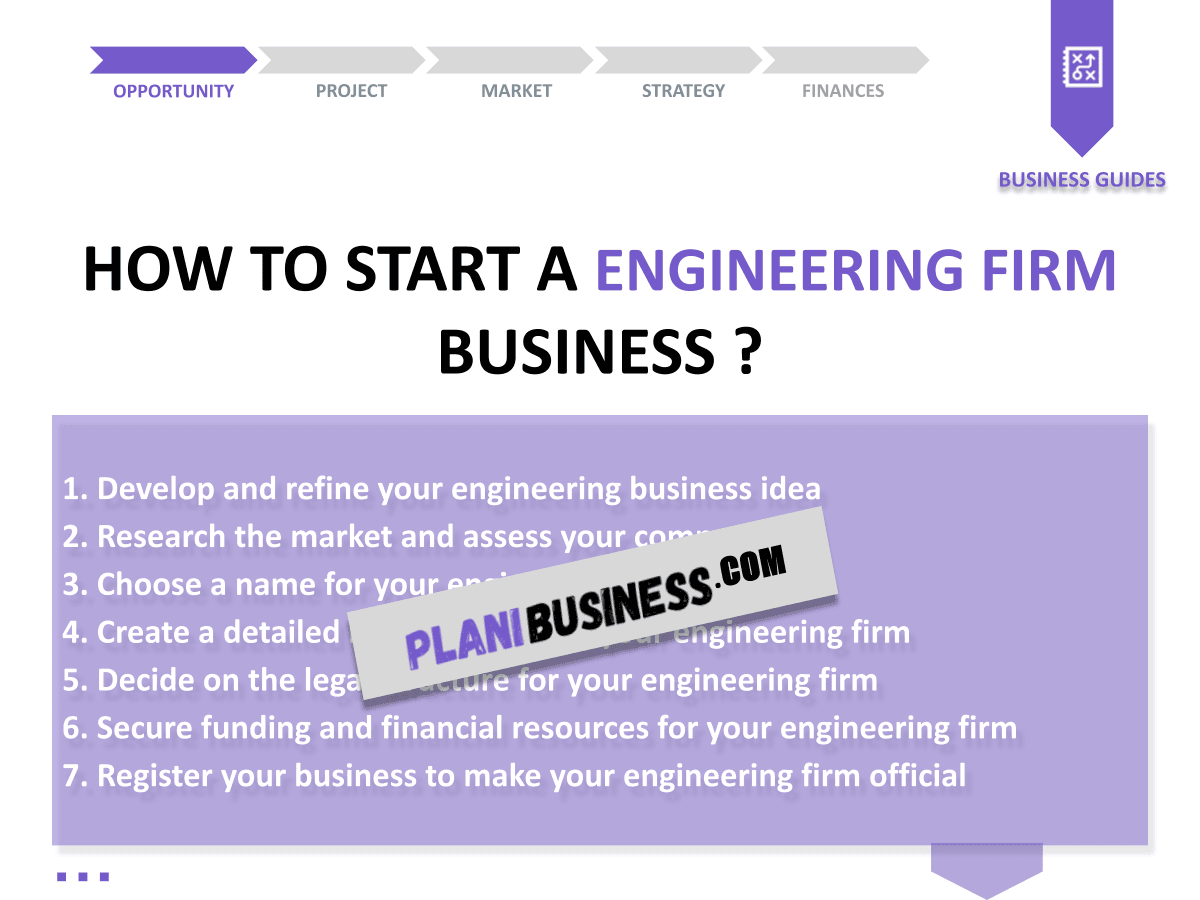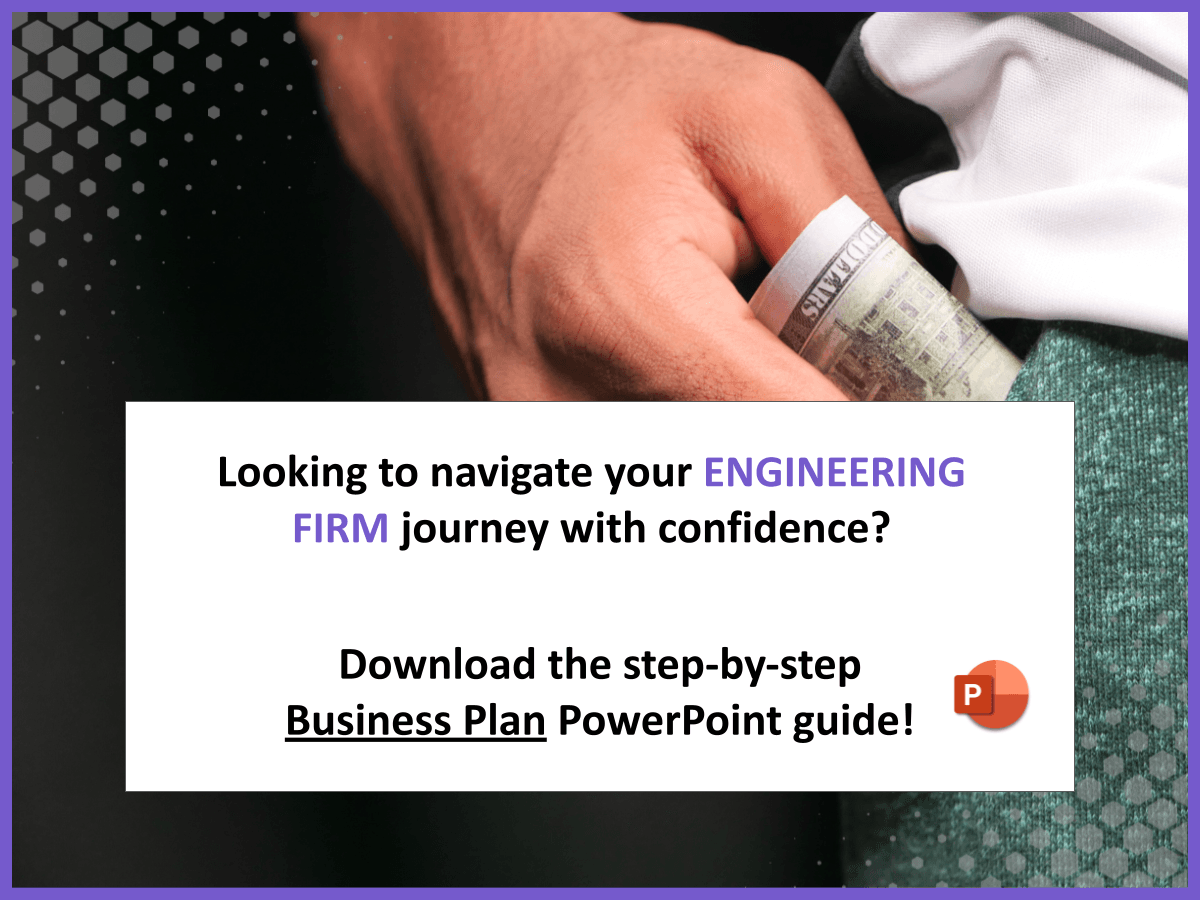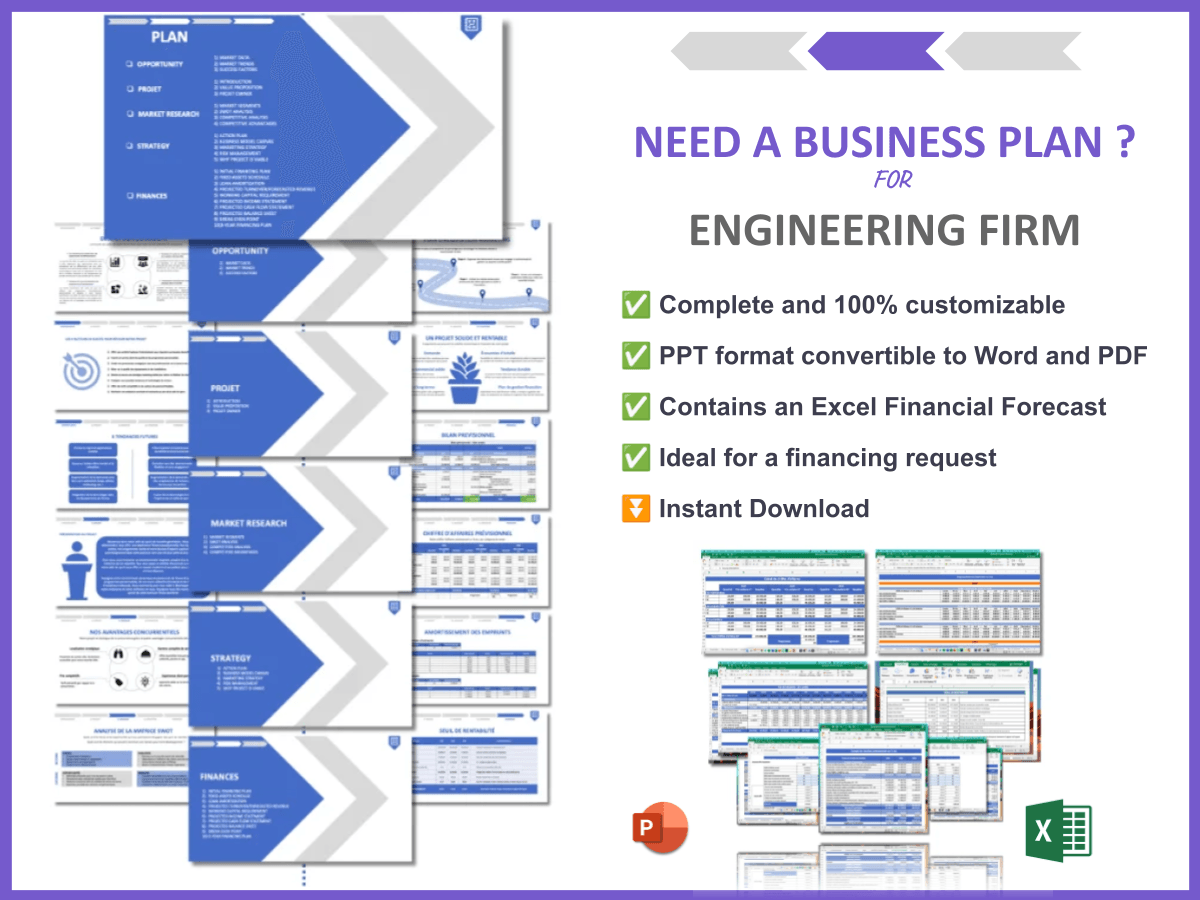Are you thinking about starting an engineering firm? You’re not alone! Many aspiring entrepreneurs are venturing into this exciting field, and the engineering sector continues to grow. Starting your own engineering firm means launching a business that provides engineering services to clients, which can range from civil engineering to mechanical design. In this guide, we’ll cover everything you need to know about how to start an engineering firm, from refining your business idea to marketing your services effectively. Here’s a sneak peek of what we’ll discuss:
- Identifying your niche in the engineering market
- Conducting thorough market research
- Creating a solid business plan
- Understanding legal requirements
- Building a strong team
- Marketing your firm to attract clients
1. What Does It Mean to Start an Engineering Firm?
Starting an engineering firm involves more than just having a degree in engineering. It’s about transforming your technical knowledge into a thriving business that meets the needs of clients in various industries. To start an engineering firm, you need to:
- Identify your specific engineering focus, such as civil, mechanical, or electrical engineering.
- Understand the market demand for your services and how you can stand out.
- Develop a strategic plan that outlines your goals, target audience, and unique selling proposition (USP).
Think about what makes your approach different. Maybe you have innovative methods, or perhaps you offer exceptional customer service. Defining this will be key to your success.
2. How to Develop Your Engineering Firm’s Unique Business Idea?
Before diving into the practical steps, you need to develop your engineering firm’s unique business idea. Consider what area of engineering you’re passionate about and how you can provide value to your clients. Think about the specific services you want to offer, such as:
- Civil engineering: Focus on construction, infrastructure, and urban planning.
- Structural engineering: Design and analyze buildings and structures.
- Environmental engineering: Work on sustainability and environmental protection projects.
Once you have a clear idea, refine it based on market demand and your skills. Use tools like surveys or interviews to gather insights from potential clients. Consider the following:
- Identify potential clients and their specific needs.
- Research the latest trends in your chosen engineering field.
- Analyze your competitors to understand their offerings and gaps in the market.
Creating a table to visualize your findings can be super helpful:
| Service Type | Market Demand | Unique Selling Proposition |
|---|---|---|
| Civil Engineering | High | Expertise in sustainable design |
| Structural Engineering | Medium | Innovative construction techniques |
| Environmental Engineering | Growing | Focus on renewable energy solutions |
This will not only help you clarify your business idea but also position your firm strategically in the marketplace. Remember, a well-defined business idea is the cornerstone of your engineering firm’s success.
3. Why Is Market Research Essential for Starting an Engineering Firm?
Market research is a crucial step in understanding the landscape of your chosen field. By assessing your competitors and identifying potential clients, you can position your firm effectively. Here’s why conducting thorough market research is vital:
- Identifying Opportunities: Understanding the market helps you spot gaps where your services can fill a need.
- Assessing Competition: Knowing who your competitors are and what they offer allows you to differentiate your firm.
- Understanding Client Needs: Gathering feedback from potential clients helps tailor your services to meet their expectations.
To conduct effective market research, consider the following steps:
- Identify your target market, focusing on specific industries or demographics.
- Analyze your competitors’ strengths and weaknesses.
- Gather feedback through surveys or focus groups to understand client preferences.
Creating a table to visualize your findings can be super helpful:
| Competitor | Strengths | Weaknesses |
|---|---|---|
| Competitor A | Strong reputation | High prices |
| Competitor B | Wide range of services | Slow response time |
| Competitor C | Excellent customer service | Limited geographical reach |
With this information, you can strategically position your engineering firm to cater to the needs of your target audience while leveraging your competitors’ weaknesses to your advantage.
4. How to Create a Detailed Business Plan for Your Engineering Firm?
Creating a business plan is essential for starting an engineering firm. It serves as a roadmap for your business and can help secure funding. A solid business plan should include:
- Executive Summary: A brief overview of your business, including your mission statement.
- Market Analysis: Insights from your market research, including competitor analysis.
- Marketing Strategy: How you plan to attract and retain clients.
- Financial Projections: Estimated revenue, expenses, and profitability.
Additionally, outline your operational plan, detailing how your firm will function day-to-day. For example, consider:
- The types of engineering services you will offer.
- Your pricing structure and billing methods.
- How you will manage projects and client relationships.
I recommend checking out this business plan template for Engineering Firm. It’s super detailed and can save you a ton of time! Having a comprehensive business plan not only clarifies your vision but also demonstrates to potential investors that you have a clear strategy for success.
5. What Legal Structure Should You Choose for Your Engineering Firm?
Deciding on the legal structure for your engineering firm is crucial. The structure you choose will affect your taxes, liability, and ability to raise capital. Here are some common options:
- Sole Proprietorship: Simple to set up, but you are personally liable for all debts.
- Partnership: Involves two or more people; profits and liabilities are shared.
- Limited Liability Company (LLC): Offers liability protection while allowing flexibility in management and taxation.
Each structure has its pros and cons, especially regarding liability and taxes. A table comparing these structures can help you make a more informed decision:
| Structure | Liability | Taxation | Ease of Formation |
|---|---|---|---|
| Sole Proprietorship | Unlimited | Personal income tax | Very easy |
| Partnership | Unlimited | Pass-through taxation | Easy |
| LLC | Limited | Pass-through or corporate taxation | Moderate |
Carefully consider your business goals and consult with a legal professional to choose the best structure for your engineering firm. This decision can significantly impact your business’s growth and sustainability.
6. How to Secure Funding for Your Engineering Firm?
Securing funding is often one of the biggest challenges when starting an engineering firm. Consider these options to finance your startup:
- Personal Savings: Using your savings can give you full control but may risk your financial security.
- Bank Loans: Traditional loans can provide substantial capital but require a solid business plan and good credit.
- Investors: Attracting investors can provide necessary funds but may involve giving up some control of your business.
When seeking funding, prepare a solid pitch that emphasizes:
- Your unique value proposition and how it meets market needs.
- Your financial projections and expected return on investment.
- Your plans for scaling the business in the future.
Additionally, consider creating a funding table that outlines your needs and sources:
| Funding Source | Amount Needed | Pros | Cons |
|---|---|---|---|
| Personal Savings | $10,000 | Full control | Risk of personal loss |
| Bank Loan | $50,000 | Large capital | Requires repayment |
| Investor Funding | $100,000 | Potential for growth | Loss of control |
By understanding your funding options and preparing accordingly, you can ensure your engineering firm has the financial resources to launch and thrive.
7. What Are the Steps to Register Your Engineering Firm?
Registering your business is a critical step to make your engineering firm official. The process may vary by location but generally includes the following steps:
- Choose a Business Name: Select a name that reflects your services and is not already in use.
- File the Necessary Paperwork: Depending on your chosen legal structure, you may need to file specific forms with your local or state government.
- Pay Registration Fees: Be prepared to pay any associated fees, which can vary significantly based on your location and business structure.
It’s also important to check if your chosen name can be trademarked. This can help protect your brand as your business grows. Don’t forget to check online databases or consult a legal professional for assistance.
After completing these steps, you’ll receive official documentation confirming your business registration, allowing you to operate legally.
8. How to Obtain Necessary Licenses and Permits for Your Engineering Firm?
To operate legally, you’ll need various licenses and permits depending on your location and the services you offer. Here are some common requirements:
- Professional Engineering License: Most states require engineers to hold a license, which typically involves passing exams and meeting education and experience requirements.
- Business License: A general business license may be required to operate legally in your municipality.
- Environmental Permits: If your work involves environmental assessments or impacts, you may need specific permits.
Make sure to research local regulations to ensure compliance. You can create a checklist to keep track of all necessary licenses and permits:
- Research state-specific licensing requirements for engineers.
- Check local business licensing requirements.
- Determine if any specialized permits are needed based on your services.
By obtaining the necessary licenses and permits, you’ll be setting a solid foundation for your engineering firm to operate successfully and legally. This not only protects you but also builds trust with your clients, showing them that you adhere to industry standards.
9. Why Is Business Insurance Important for Your Engineering Firm?
Business insurance protects your firm from potential risks and liabilities that can arise in the engineering field. Without adequate coverage, a single incident could jeopardize your entire business. Here are some types of insurance you should consider:
- General Liability Insurance: Covers claims of bodily injury or property damage that occur on your business premises.
- Professional Liability Insurance: Also known as errors and omissions insurance, it protects against claims of negligence or failure to deliver professional services.
- Workers’ Compensation Insurance: Required in most states, this covers medical expenses and lost wages for employees injured on the job.
Evaluating your risks and choosing coverage that suits your firm’s needs is essential. Consider creating a table to outline your insurance needs:
| Type of Insurance | Coverage | Why It’s Important |
|---|---|---|
| General Liability | Bodily injury, property damage | Protects against lawsuits |
| Professional Liability | Negligence claims | Safeguards your reputation |
| Workers’ Compensation | Employee injuries | Legal requirement in most states |
Investing in the right business insurance not only protects your engineering firm but also provides peace of mind, allowing you to focus on delivering quality services to your clients.
10. How to Set Up Financial Management Systems for Your Engineering Firm?
Effective financial management is crucial for your engineering firm’s success. A well-organized financial system allows you to track income, expenses, and profits, ensuring your business remains profitable. Here are some essential steps to set up your financial management systems:
- Select Accounting Software: Choose software that fits your business needs, such as QuickBooks or FreshBooks.
- Track Income and Expenses: Regularly record all financial transactions to maintain accurate records.
- Implement Invoicing Procedures: Create a standardized process for invoicing clients to ensure timely payments.
Consider developing a financial plan that outlines your budget, projected income, and expenses. Here’s a simple example of what to include:
- Estimate startup costs (equipment, licenses, marketing).
- Project monthly income based on expected projects.
- Outline recurring expenses (salaries, rent, utilities).
Having a clear financial management system not only helps you stay organized but also provides insights into your engineering firm‘s financial health, allowing you to make informed decisions for future growth.
11. How to Establish Your Brand Identity as an Engineering Firm?
Your brand identity sets you apart from competitors and influences how clients perceive your engineering firm. A strong brand can build trust and attract more clients. Here are key elements to consider when establishing your brand identity:
- Create a Memorable Logo: Your logo should reflect your firm’s values and the services you provide.
- Develop Consistent Messaging: Ensure that your messaging aligns across all platforms, from your website to social media.
- Professional Marketing Materials: Invest in high-quality business cards, brochures, and presentations that showcase your services.
To further solidify your brand, consider the following:
- Define your mission and vision clearly.
- Identify your target audience and tailor your branding to their preferences.
- Engage with clients through social media to build a community around your brand.
Creating a table to compare your brand elements can help you visualize your strategy:
| Brand Element | Current Status | Action Plan |
|---|---|---|
| Logo | Needs redesign | Hire a graphic designer |
| Website | Basic design | Update with professional layout |
| Social Media Presence | Minimal | Increase engagement through posts |
By focusing on these elements, you can create a strong brand identity that resonates with your audience and enhances your engineering firm‘s reputation.
12. What Are Effective Marketing Strategies for Your Engineering Firm?
Marketing is vital to attract clients to your engineering firm. A well-thought-out marketing strategy can significantly impact your business’s visibility and growth. Here are some effective strategies to consider:
- Create a Professional Website: Your website should serve as a portfolio showcasing your projects and services.
- Utilize Social Media Platforms: Engage with potential clients and showcase your expertise through platforms like LinkedIn and Instagram.
- Network at Industry Events: Attend conferences and trade shows to meet potential clients and partners.
Developing a marketing plan that highlights your services and expertise can help you reach your target audience. Consider these additional tactics:
- Offer free consultations to attract new clients.
- Use email marketing to keep in touch with past clients and prospects.
- Invest in search engine optimization (SEO) to improve your website’s visibility.
Analyzing your marketing efforts regularly will help you adjust strategies as needed for better results. Consider creating a table to track your marketing activities:
| Marketing Activity | Target Audience | Expected Outcome |
|---|---|---|
| Website SEO | General public | Increase website traffic |
| Social Media Campaign | Potential clients | Higher engagement |
| Networking Events | Industry professionals | Generate leads |
Implementing these strategies will help you build a strong presence in the market and attract clients to your engineering firm.
13. How to Assemble Your Team for Your Engineering Firm?
Building a strong team is essential for delivering quality services. The success of your engineering firm heavily relies on the skills and expertise of your team members. Here’s how to assemble a talented team:
- Hire Skilled Engineers: Look for individuals with the necessary qualifications and experience in your specific engineering field.
- Include Administrative Support: Having administrative staff can help manage day-to-day operations efficiently.
- Consider Marketing Professionals: A dedicated marketing team can help promote your services and reach potential clients.
When hiring, consider the following steps:
- Define the roles and responsibilities needed for your team.
- Conduct thorough interviews to assess candidates’ skills and cultural fit.
- Provide training and development opportunities to enhance team capabilities.
Creating a team structure can help you visualize how your firm will operate:
| Position | Responsibilities | Qualifications |
|---|---|---|
| Project Manager | Oversee projects and client relations | Degree in engineering, project management experience |
| Lead Engineer | Design and implement engineering solutions | Professional engineering license, relevant experience |
| Marketing Specialist | Develop marketing strategies and campaigns | Degree in marketing, experience in digital marketing |
By assembling a skilled and dedicated team, you will enhance your engineering firm’s ability to deliver high-quality services and achieve long-term success.
Conclusion
Starting your own engineering firm can be an incredibly rewarding venture. By following the steps outlined in this guide, from developing a unique business idea to assembling a talented team, you can position your firm for success in a competitive industry. Remember, the journey of entrepreneurship is filled with challenges, but with the right planning and execution, you can achieve your goals.
As you continue to grow your firm, consider expanding your knowledge further. I recommend checking out our articles on how to create a SWOT Analysis for Engineering Firm and learn how to build an effective Engineering Firm Marketing Plan. These resources can provide valuable insights that will help you navigate the complexities of running a successful engineering business.
FAQ
- What are the first steps to start an engineering firm?
The first steps include identifying your niche in the engineering field, conducting market research, and developing a solid business plan. It’s essential to understand your target audience and the services you want to offer. - How much does it cost to start an engineering firm?
The startup costs can vary widely based on your location, business structure, and services offered. Typically, you should budget for licenses, insurance, office space, equipment, and marketing expenses. - What legal structure is best for an engineering firm?
Choosing between a sole proprietorship, partnership, or LLC depends on your business goals, liability concerns, and tax considerations. An LLC often provides liability protection while allowing flexibility in management. - Do I need a business plan for my engineering firm?
Yes, a business plan is crucial as it outlines your vision, market analysis, marketing strategy, and financial projections. It also helps in securing funding from investors or banks. - What licenses do I need to operate an engineering firm?
Licenses vary by state and the type of engineering services offered. Generally, you will need a professional engineering license, a business license, and potentially environmental permits. - How can I effectively market my engineering firm?
Effective marketing strategies include creating a professional website, utilizing social media, networking at industry events, and implementing SEO practices to increase your online visibility. - What types of insurance do I need for my engineering firm?
Essential types of insurance include general liability insurance, professional liability insurance, and workers’ compensation insurance. These cover various risks associated with running an engineering business. - How do I find clients for my engineering firm?
Finding clients can be achieved through networking, referrals, online marketing, and attending industry events. Building relationships and showcasing your expertise is key to attracting clients. - What should I include in my financial management system?
Your financial management system should track income and expenses, invoicing, budgeting, and provide insights into your firm’s financial health. Consider using accounting software to streamline these processes. - How can I build a strong team for my engineering firm?
To build a strong team, hire skilled engineers and support staff, clearly define roles and responsibilities, and provide ongoing training and development opportunities to enhance team capabilities.







